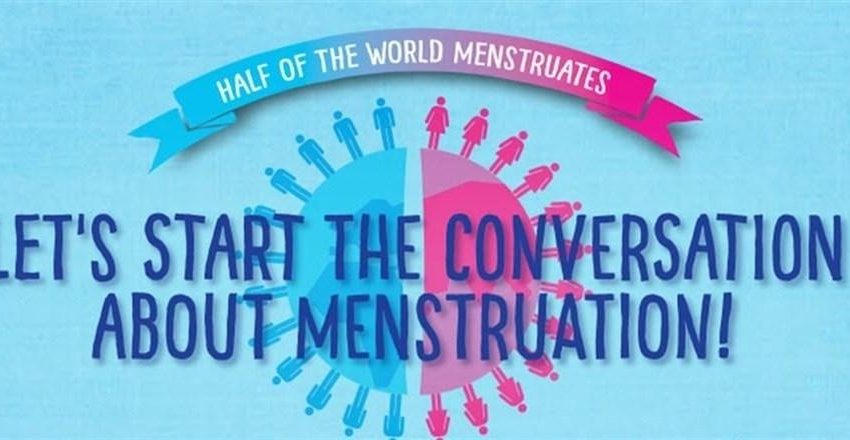
Menstrual Hygiene – Let’s Break The Bloody Taboo!
By Comfort Mussa
 It’s over a year now, since the government of Cameroon banned the use of non biodegradable plastics. Like other Cameroonians I still grapple with the insufficiency and high cost of the alternatives. Shop owners often do not provide packaging for goods bought. Customers pay for plastic bags (biodegrable?) or bring their plastic/paper bags from home. However, when I go to the shops to buy sanitary towels, without asking the shop owners will wrap it up carefully in a black plastic bag or news paper. Some shop owners say, pads are too private to be exposed like they will do other sanitary products like toothpaste or toilet tissue. There’s always packaging for pads and tampons.
It’s over a year now, since the government of Cameroon banned the use of non biodegradable plastics. Like other Cameroonians I still grapple with the insufficiency and high cost of the alternatives. Shop owners often do not provide packaging for goods bought. Customers pay for plastic bags (biodegrable?) or bring their plastic/paper bags from home. However, when I go to the shops to buy sanitary towels, without asking the shop owners will wrap it up carefully in a black plastic bag or news paper. Some shop owners say, pads are too private to be exposed like they will do other sanitary products like toothpaste or toilet tissue. There’s always packaging for pads and tampons.
I appreciate the service. What I do not appreciate though is that in my society the subject of menstruation is swept under the rug in similar ways as the shop owners will do my pad. For most people it is a taboo subject. In some communities women are considered unclean during their periods and excluded from certain socio cultural events. The lack of public services that cater to the hygiene needs of women and girls excludes them from some social and professional activities.
May 28th is Mentrual Hygiene day. The day helps to break the silence and build awareness about the fundamental role that good menstrual hygiene management (MHM) plays in enabling women and girls to reach their full potential. As we commemorate , I hope that the myths, silence and taboos around menstruation will be broken. Half the population of Cameroon menstruates and conversations on the subject very important because ;
- We have dwelt long on the subject of water scarcity in especially Bamenda and Cameroon at large. To cope with the water scarcity some women are adopting coping strategies like reducing the number of baths they take daily. Menstrual hygiene is impossible without clean, accessible water. As the world commemorates Menstrual Hygiene day this year, as a Cameroonian woman affected by the water crisis I call on the government of Cameroon and water corporation to fix the water problem in our country. Do you see how nasty and smelly our town gets when the city council fails to collect garbage around the city on time? The human body also has the capacity to smell awful and look nasty without proper hygiene. Water is a fundamental human right! Women in Cameroon don’t have to go another day without the safety in knowing that water will flow when they open the taps especially during their periods.
- If menstruation is a taboo subject, sex during menstruation is a double taboo subject. Of course personal preferences matter here. However in rural Cameroon, it is not uncommon to hear that some menstruating women do not touch or share a bed with their husbands. As messy as it may be, I believe women have got to share their stories at least with other fellow women on subjects like this especially since there is a profound lack of useful information about the sexuality of African women. The stories from the bedrooms of African women on the subject of bloody periods and sex are as wide and varied as there are women and different cultures in Africa. Am glad that some women are framing discussions around their sexual and reproductive health needs including evening taboo subjects like Bloody Periods & Sex.
- It is high priority. Visit some of the inner-city as well as rural schools in Cameroon. Most of the schools have inadequate toilets for the ratio of students and often no running water in the toilets. Often times, the toilets are smelly, no toilet paper and worse case scenarios some of the doors cannot be locked. Even public spaces like Bamenda main market has only four toilets for the over 5000 traders and customers who visit the market daily. The grave lack of facilities and appropriate sanitary products can push menstruating girls out of school and working women away from work. Menstruating women and girls need access to clean water, clean and safe sanitary products, and to a clean and private space in which to change menstrual their pads

In Cameroon street pidgin, when a guy is broke he says “I di see ma menses”. Guys equate being broke with menstruation. This speaks volumes of the situation women in Cameroon ecounter and the inconveniences they are put through when basic hygiene products and facilities are not available.
It is challenging to talk about national emergence and sustainable development and women’s empowerment if day-to-day practical needs are ignored .Without access to toilets, sanitation facilities, menstrual pads and information, girls and women will be unable to thrive at school , work or play.
For more information about Menstrual Hygiene Day visit http://menstrualhygieneday.org/



I think this topic is a rarely discussed subject when it comes to women’s menstruation and related issues. Even when its talked of, many in society see menstruating women and girls in the negative light. When I sit with male peers and complain of not feeling find they tell me in our local pidgin English” dear bottle oil don broke?” To me it sounds negatively funny. Some men even go as far as avoiding to go closer to their partners when they are menstruating. Some say say we the women have a terrible odour when when menstruation is on and so need to take a bath about thrice a day. The situation is worst now that we have water crisis in Cameroon precisely in Bamenda to keep ourselves properly clean during menstruation. When I spoke with some men they confessed that they can never touch a woman even when she needs help or in difficulty during her menstrual cycle because it stinks.
I just think on such a day for MHM women and girls need to speak out on those issues that hinder their hygienic conditions during menstruation and also decry negative conceptions because of their biological nature.